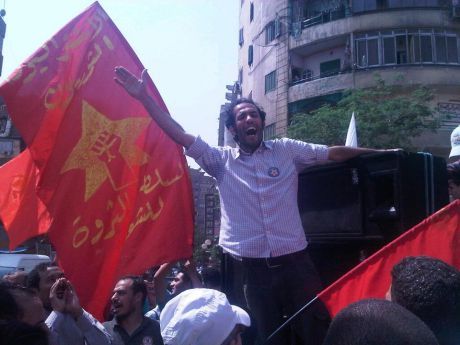News
You are here
Strikes and protests continue in Revolutionary Egypt

May 1, 2013
Since the Egyptian Revolution toppled the Mubarak regime on January 25, 2011 numerous strikes and protests have continued to develop in cities across Egypt. These are a reflection of Egyptians’ dissatisfaction with the economic and political direction their country is headed under the rule of Mohamed Morsi and the Muslim Brotherhood. Basic demands by the people—including bread, freedom, social justice, and human dignity—continue to be ignored, only adding to the tension building in the streets and further pushing the revolution forward.
Cairo’s central October 6 Bridge was blocked off by local taxi drivers demanding their car payments be cancelled. They staged their sit-in for six hours and finally ended following negotiations with security forces. Taxi drivers and microbus drivers have also demanded a solution to the shortage of diesel fuel, and improvements in security at petrol stations after a group of individuals stole fuel supplies. In Mahalla, intensive strikes and protests brought traffic to a standstill when protesters prevented buses from moving, halted public transportation and blocked the transit arteries of the city. The combination of strikes and acts of civil disobedience led to the closure of approximately 1,300 factories and local shops.
Protesters accuse Morsi and the Muslim Brotherhood of using Mubarak-era methods to subdue protests and strikes. A number of cities—including Port Said, Mansoura, Tanata and Mahalla—have engaged in immense protests calling for civil disobedience. Just last month, hundreds of people from the Mahalla region went on strike, blocking off main routes into the city. The month of April continues to see similar activity unfolding across the country.
Some strikes were approached by armed forces in a particularly unusual manner. Rather than breaking up the strikes by force or through orders of arrest, striking train drivers were issued call-up papers conscripting many to work in the Armed Forces’ Transport Directorate. Morsi’s government has resorted to intimidation by enforcing illegal imprisonment; illegal, because neither the army nor the government has the right to conscript anyone except in particular circumstances such as during a time of war. In these situations, the President can issue an order for general mobilization, which clearly is not the case here. The striking train drivers were handed a written ultimatum by armed forces. Those who failed to serve their duty faced imprisonment for six months, or a fine of 5,000 Egyptian pounds, or both. To make matters worse, negotiations to cancel the orders presented by the armed forces broke down and the drivers were detained and left without food or water for hours. What is developing here is an attempt to force drivers from implementing their right to strike by prosecuting them under military law.
The Egyptian Revolution continues to gain momentum in struggling to achieve the basic demands of the people but this movement will surely continue to encounter obstacles thrown at it by the Egyptian government. Solidarity among Egyptian people is a vital component in the continuation of the movement, but significant international solidarity with the people of Egypt will also be critical to its success.
Section:
Topics:










